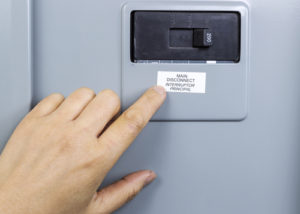As with most equipment and devices there is always the possibility of damage or malfunction taking place and a GFCI breaker is no exception. Although this device is responsible for detecting glitches or imbalances in the flow of electrical current there are several circumstances that can cause them to trip.
What can Cause that GFCI Breaker to Trip
 Have you ever noticed that the GFCI breaker trips whenever you turn on a light or television? These occurrences can certainly be an annoyance and pose several hazardous risk in the home including risk of fire or serious injury. So if you or someone you know has been experiencing tripping with their GFCI breaker they should be aware of what the possible cause may be and promptly have the issue rectified. Here are a list of some of the most common causes of GFCI breaker tripping in the home.
Have you ever noticed that the GFCI breaker trips whenever you turn on a light or television? These occurrences can certainly be an annoyance and pose several hazardous risk in the home including risk of fire or serious injury. So if you or someone you know has been experiencing tripping with their GFCI breaker they should be aware of what the possible cause may be and promptly have the issue rectified. Here are a list of some of the most common causes of GFCI breaker tripping in the home.
-
Water – If a cable, connector, wire or plug is wet or has had any water damage and is plugged in for use then this can cause tripping to occur. So it is important to keep all electrical components and connections dry and away from water.
-
Grounding – Within a circuit there is a wire that functions to safely disperse any electrical leak safely. If this wire is not properly connected it can alter the flow of overall current throughout the circuit. As a result of this the circuit may overheat and cause damage to the breaker.
-
Distance – Distance between the control and main power panels of the electrical system may cause the amps in the circuit to fluctuate enough so to cause the breaker to trip. To prevent or reduce the chances of this happening an electrician should use larger wires when installing the system.
-
Unbalanced loads – There may be some devices in the home that constantly turn on and off. Due to this substantial disturbance is created within the circuit which can cause a trip. To prevent this larger appliances can be moved to their own circuits to prevent nuisance tripping.
-
Hi Amps – When a GFCI breaker is installed the set amperes may be too low to facilitate some electrical loads within the circuit this too can cause a breaker to trip. So check to make sure that your appliances are not drawing more power than the breaker can handle.
-
Faulty Breaker – One very common cause or possibility that may initiate tripping in a GFCI breaker is the fact that it may be faulty. Over time a breaker will suffer wear and tear and may not work correctly due to damage sustained while manufacturing or shipping.
Now that the most common causes of GFCI breaker problems have been listed, people experiencing any issues in their home will be able to identify the causes. Nevertheless it is highly recommended that a certified electrician be retained to perform such tasks as they are trained and attempting to do it on your own is considered hazardous. Contact us for more information.

